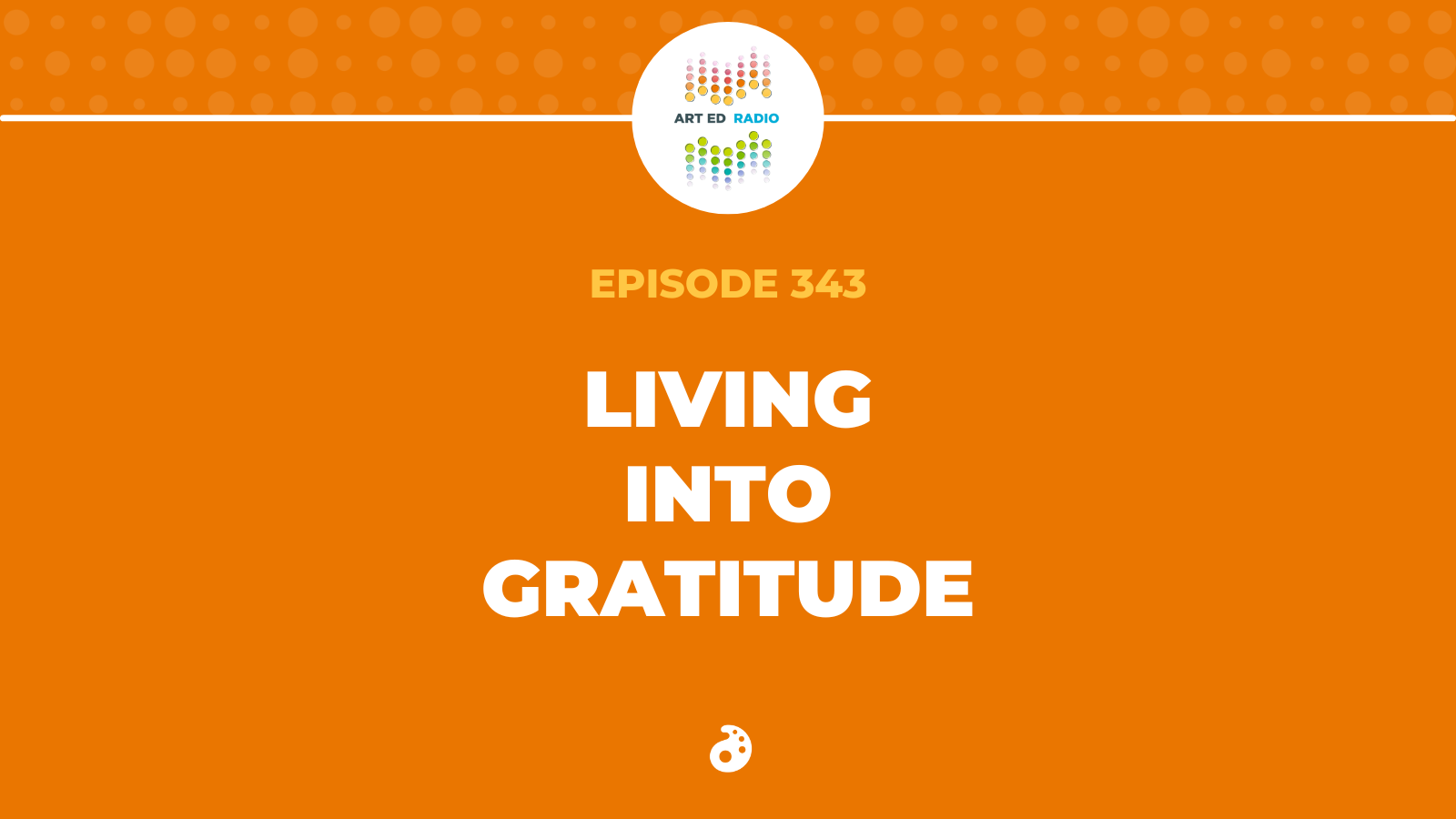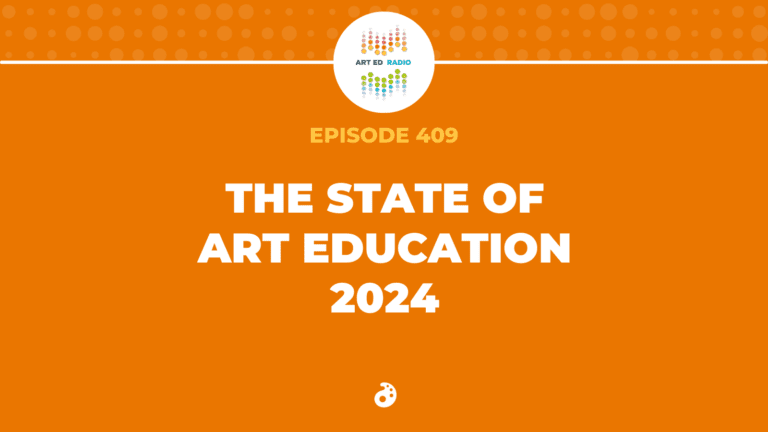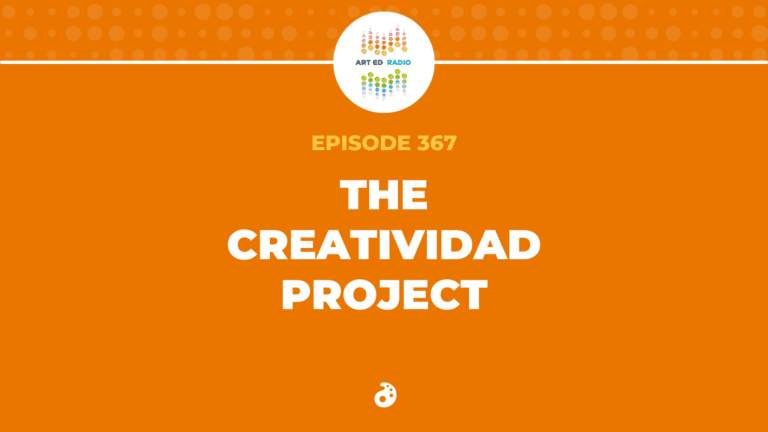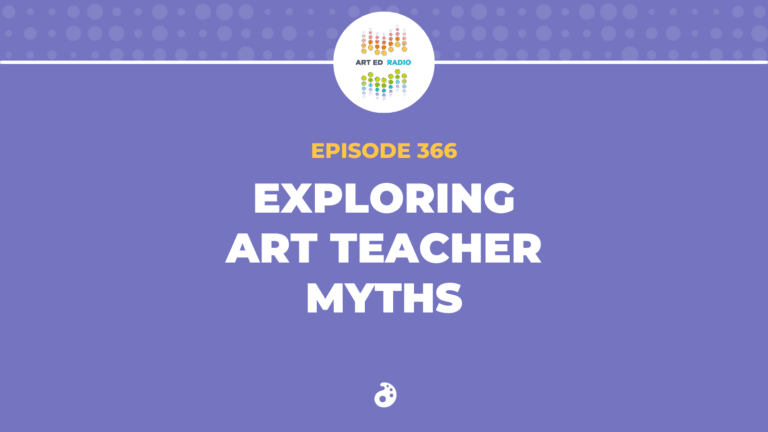After last week’s episode on wellness, Tim extends the conversation this week as Chelsea Fleming joins the show to talk about how we can live into gratitude. Listen as Tim and Chelsea discuss their shared disdain for gratitude journals, the importance of reflection, and why we should try to show appreciation and kindness to ourselves. Full Episode Transcript Below.
Resources and Links
- Listen to Chelsea’s last appearance on the podcast
- How to Take Care of Yourself and Avoid Burnout
- Read more about Susan Cain’s Bittersweet
- Learn about Michael Bungay Stainer

Transcript
Tim: Welcome to Art Ed Radio, the podcast for art teachers. This show is produced by The Art of Education University, and I’m your host, Tim Bogatz.
We are coming back today with another episode that will hopefully help us address our mental and physical health, and we’re going to do our best to continue to stay away from the phrase self-care. I feel like it’s overused, it’s overdone. People are tired of hearing it, but it’s still important to spend the time and the energy we can, both mentally and physically, to take care of our health. We talked a lot about that last week on the episode with Jess Madenford and wellness. Today, we are going to talk about gratitude. Now, when I hear the phrase gratitude, unfortunately, it conjures up all these visions of gratitude journals and writing down three things that you’re thankful for every night.
That’s not it for me. It’s not a habit I could ever get into. And then even when I forced myself to, I couldn’t make it an effective practice for me. There are a million things that I’m grateful for and I appreciate them so much, but I don’t have the time or the energy or the desire to consistently write them down. And then when I avoid that, I’m grateful for not having one more thing on my to-do list. Now, let me be clear though, if gratitude journals work for you, that is amazing. I’m incredibly happy for you. If you love the phrase self-care, again, I am incredibly happy for you. I’m so glad that those concepts are working for you.
Just please don’t be offended if I talk badly about them, but the reality is they’re not working for me and they’re not working for a lot of the people that I talk to. Instead, today we’re going to talk about living with gratitude, what that concept is, and some of the ways in which we can do that. My guest will be Chelsea Fleming. She’s a former art teacher, former instructional coach, current colleague here at AOEU, where she does just so many different things. But she’s been on the podcast before talking about student engagement. I’m really happy, maybe even say grateful that she was willing to come back on today to talk about gratitude with me.
Let’s go ahead and bring her on. All right. Chelsea Fleming is back on the show. Chelsea, great to have you back. How are you?
Chelsea: Hello. I’m fantastic. How about yourself, Tim?
Tim: Great. We have a lot of cool stuff to talk about. I chatted in the intro to this episode a little bit about just sort how we’re sick of the idea of self-care. Janet Taylor, who works with us, was on the podcast a few weeks ago, and just this random thought that I had put out there in our conversation of just like, “Oh, the phrase self-care is just very tiring at this point. We’re kind of sick of it.” And like I said, I thought that was just kind of a random thought, but I received just a lot of feedback just along those lines like, “Yes, I’m so sick of hearing about self-care.” Anyway, I’m apparently not the only one. But my question for you is, why do you think that that feeling is so pervasive, especially amongst teachers?
Chelsea: Sure. Let’s admit too really quick that living into gratitude, this time of year, that’s something that we really think about. That’s something, especially when it comes to self-care, that we are feeling is a major turnoff right now. I hear you. I think there’s a few reasons we’re feeling this way. First, the pandemic, of course. It made self-care a total buzzword, like all the other educational buzzwords that come along. It was everywhere and all the time and not without justification. But it felt a lot like hearing that popular song on the radio. We get it. Things like gratitude journaling are supposed to be good for us. Blah! I feel like teachers often see their profession as one of the largest parts of their identity.
When your profession is feeling undervalued, you feel undervalued. Honestly, no one wants to hear everyone’s, “You deserve self-care. You deserve time off. You deserve,” when nothing that really matters seems to be changing. At least it feels that way, right? And then word, I feel like some of us have a hard time relaxing. And for many, self-care and that relaxing or that time off or doing things like buying yourself a fancy Starbucks drink or letting things slide isn’t really it for us. What if you aren’t interested in those things? You aren’t really grateful for the time off.
I don’t know about you, but when I was in the classroom all the time, my husband would be like, “You’re getting a part-time job next summer,” because I really did go bonkers with extended breaks and things like that. Maybe it just isn’t your love language. I think there’s probably more reasons, but those are just a few that feel relatable to me at least.
Tim: Yeah, no, all three of those make a lot of sense to me. I think those are good points. Now, when you first started answering that question, you used the phrase living into gratitude, which I think is worthwhile. It’s something I definitely want to do as long as, like you said, it doesn’t come with a requirement of journaling every single day. Aside from the gratitude journal, what are the benefits we see when we are practicing gratitude? And I guess extending that, why do you think we aren’t doing a lot of that already?
Chelsea: Sure. Well, I do feel like appreciation and kindness really do come easily to us as teachers. We’re in a caring profession. And at this time of year, we especially focus a lot on sharing our gratitude for others. However, I’ve found that in my time as a department chair and as an instructional coach, that teachers often tend to have a hard time showing that appreciation and kindness towards themselves. Ultimately, it’s supposed to be a great thing for us.
Sources like Psychology Today, and some of those will really tell us the benefits of gratitude are things like improved psychological and physical health, better sleep, better self-esteem, improved relationships, all of that stuff. But like you said about journaling, what are maybe some ideas for living into that that maybe aren’t hokey or forced or feel like just another obligation.
Tim: Yes. Yes. Let’s talk about that. Can we talk about some of the ideas you shared with me about, like you said, easy ways to live in gratitude? I have to admit, the first one that you told me about does sound a little hokey, like you said. But can you just tell me about giving yourself a high five?
Chelsea: Yep, I get you. It might sound a little hokey at first, but what a quick idea, right? Probably the easiest one to implement to show yourself just a little bit of gratitude each day is to give yourself a high five in the mirror. That’s it. You just give yourself a high five. This is not my idea. It comes from the author, speaker, and podcaster Mel Robbins, I don’t know if you’re familiar with her, but I really started listening during shut down and stuff. She just had a very real voice a lot. Started picking up some of her stuff. She has a book that she put out recently called The High 5 Habit, and she shares that really simple idea of giving yourself that high five every day.
Of course, she takes stuff like the idea of believing in yourself a lot further, and she offers lots of support, but this quick idea really feels like something doable to me. I could even see a high five reminder written on the mirror at home or at work. Anyway, we know how powerful giving high fives or fist bumps or air high fives, whatever, can really be for students. Creating that connection and showing love to them seems easy. It kind of makes sense that we would do that to feel good and show ourselves that tiny bit of gratitude too.
Tim: Yeah, that makes sense. I talk on this podcast all the time about connections and community and just little things like that. That makes a lot of sense to me. Another idea that really resonate with me is what you called the ratio of progress. Can you talk about that concept and maybe share some tips on how to make that work?
Chelsea: Sure. I don’t know if I’ve talked with you specifically about my favorite author of all time, but I feel like I share his stuff all the time and everywhere. If I ever say anything, it’s probably not an original thought of mine. It actually comes from Michael Bungay Stanier. He is the author of some great coaching books, The Coaching Habit, The Advice Monster. Anyway, fantastic. But he recently sent out an e-newsletter. Of course, I’m signed up, so every week I hear from him. It really kind of struck a chord with me a few weeks back. He shared this quote from this Olympic runner, Alexi Pappas. Okay, so here we go.
I’m hoping that I don’t totally blow this up. Oh, there we go. It said something to the effect of when you really are chasing a dream, you’re supposed to feel good about a third of the time. And then okay, a third of the time, and then you’re really going to probably feel crappy the other third of the time. Those ratios are okay. Because if you’re actually pursuing something that’s worthwhile, you’re not going to be feeling fantastic about all things all the time, or else then you’re not really mentioning yourself, you’re not growing and getting out of your comfort zone or accomplishing something big. Does that make sense?
Tim: Yeah, for sure.
Chelsea: I thought it was a really cool quote. He ultimately connects it back to the work he’s doing on writing a new book and how it’s really been something he’s been wrestling with, but you could relate it to anything you’re wrestling with, like a goal or a tough time or a task, or even something you have a love-hate relationship with running or maybe the school year right now.
Tim: The school itself.
Chelsea: He stresses that this idea just gives us permission to feel that mix of okay and great and crappy all at the same time, especially when you’re doing good work. The tippy shares is to set an alarm for the end of the work day each day, and then the goal when it goes off is to stop working and then to write down something worth celebrating from that day. I know we might be gratitude journaling averse, but you could just bypass the writing part and take a moment to reflect.
The idea though is really to instead of driving home and replaying those hardest parts of the day, to just really be intentional, excuse me, about thinking about, well, what is it that is maybe a celebration? And then I love the idea of having that alarm on your phone too to just say, “Hey, it’s time to be done right now and let’s think about something positive.”
Tim: I’m really bad about being done at a certain time, and I’m also really bad about just focusing on the positives all the time. I think those are things that definitely could work for me. My question though is, I don’t know, about doing all those things. We’ve bashed the gratitude journaling, which I don’t want to dwell on that too much.
Chelsea: I don’t want to bash it.
Tim: No. I don’t either. I don’t know. We’re going to have a bunch of people who love gratitude journals just sending me angry emails. That’s all right. But I think whether it is that journaling or some other type of reflection, a lot of times it feels like another thing to do. It feels like another obligation, which we’re trying to have fewer of. It makes it too hard to stick with it. But I know you do some other types of writing outside of the journaling. Can you share with us some of the things you do and some of the benefits that you see from those?
Chelsea: And just note, I’m not a writer in any capacity. This is just some quick things that help out. One of them I’ve done in waves. Sometimes I stick with it, sometimes I don’t. Sometimes it’s an every morning thing. Sometimes I’ve used this in the evening before bed when a day has been particularly tough. But I’ve used the journal Two Minute Mornings, and you can find it on Amazon and all of that stuff. The basic idea with this one is that you write down something that you’re thankful for, and that can be as few as one thing, or you could just fill the whole page. I mean, it’s really up to you. There’s no set thing.
But honestly, it just has a little box. For me, I’m like, okay, I can write one thing really big in the box, or I can put a couple of things. Anyway, and then it asks you to jot down three things you plan to focus on for the day. It’s just starting the day with a little bit more intention than typical. And then it asks you for one thing that you’re willing to let go. And that thing’s huge for me. My Enneagram I personality totally eats that up. Actually writing things down that I can let go of is just really a big deal. It’s also great to look for the good things, because I’m just really critical of myself.
It can be really nice to be like, “Well, I was beating myself up about that yesterday, or I was still thinking about this in the shower this morning, but I’m going to go ahead and give myself permission to let that go.” It is something that I’ve done consistently at times, and then not at others. It just comes in seasons in my life, I feel like.
Tim: I like that idea where you don’t have to do it all the time, but it’s there for you when needed. Okay, any other types of writing that you like to do?
Chelsea: In this one, actually this idea came from a book I was reading recently called Bittersweet. It’s by the author of Quiet. I don’t know if you read that one about introverts and all that. Fantastic read.
Tim: As an introvert, very excited about that book.
Chelsea: This one, Bittersweet, it’s a really interesting read. Its longer title is How Sorrow and Longing Make Us Whole. It’s, again, really interesting. But in this book, the author speaks a little bit about how we all live in this culture where everything should be good all the time, or at least we’re made to kind of feel that way. I know you’ve talked about this on the podcast before, when people ask, “How are you,” everyone’s response is the smile and, “I’m good.” But I think and clearly so does this author that sometimes it’s okay to really put out there into the world all the feels. It’s okay to feel the fields.
She shares this study done, gosh, University of Texas I believe it was, by a social psychologist, where they had these groups where they asked people to write about their hard times. They actually ended up being calmer and happier than those people who just wrote about anything at all. They wrote about the tough stuff. There even seemed to be some links to physical health benefits to this. The idea is that you’re writing down all of the tough stuff and just getting it out. Instead of gratitude journaling and focusing on what’s the good things, that it’s okay to write down all the crummy stuff.
The idea is that when we get out all of those things, we stop thinking about them as misfortunes or as flaws, but instead think about as opportunities for insight and growth. How many times have you had a really tough time, and then when you’ve gotten through it, you’ve been like, “Oh my gosh, my life is so much better now that I have been through that tough time, or I learned so much from that.” Instead of focusing on the good, sometimes it is okay to just get out the tough stuff. And then the idea is that you’ll be able to look back and think about it more as a spot of insight or of growing.
Tim: Yeah, just a growth opportunity. I appreciate that idea because like you said, a lot of times we don’t feel like we have the permission structure to think about those things because we’re always, like you said, trying to put on a show or trying to let everybody know that things are perfect even when they’re not. I think taking some time to reflect on that, like you said, using it as a growth opportunity is a really good growth opportunity. I don’t know how to phrase that exactly. But I do appreciate that idea. Now, along with reflection and thinking about these things, I know that one thing that always helps me feel better and actually helps me reflect, gives me time to do it, is running.
I know not everybody loves to run. Just quick aside here, because I know you work out a lot too, but a running friend of mine has this theory, we were just talking about this, that people hate running because they work too hard at it. They go out too fast and they stress themselves out about it. They go too hard and they’re like, “This is miserable.” He thinks that everybody should just… No, he thinks everybody should just slow down and run 12 or 13 minute miles just as slow as possible. More people would enjoy running if they just chilled out about a little bit more.
Anyway, I think there’s some validity to that. But anyway, the point I was making is not everybody loves to run, but I think there is something about physical activity that that’s worthwhile. Do you find that it’s worth it for us to find the time to perform any kind of a physical activity?
Chelsea: Oh gosh, yeah. Absolutely. I know I talk big about running being terrible, but I really do enjoy it too. I’m into all things physical fitness. It is one of my mental health go-tos is when I’m feeling tough is to move my body. I really do believe in that idea of, you’re right, even if we’re not trying to run six minute miles and do these awesome things, we can just move around a little bit and remember that it does something to us when we move our body around, when we’re having a hard time getting motivated or staying positive or finding the good.
Even just doing a couple pushups. I mean, that doesn’t have to be legit pushups, just like you’re saying about slowing down with running. Why not some wall pushups or from a chair or a bench or from your knees? Whatever it takes. But I do feel like sometimes having that little bit of physical activity can just help you feel good and impact your attitude. Absolutely.
Tim: All right, that’s awesome. Chelsea, thank you. I appreciate all of this. I appreciate all the research you bring into it and all the ideas that you have for everybody. Before we go, any last words of advice for people?
Chelsea: Oh, I just think that these ways to live into gratitude field just a little more real than the idea of pouring out that long list of good things each day. My hope is that everyone will find something or a combination of things that helps them to feel a little more kind and appreciative towards themselves.
Tim: Oh, sounds good. Chelsea, thank you so much. It has been great to talk to you today.
Chelsea: Thank you, Tim.
Tim: All right. Thank you to Chelsea for sharing so many wonderful ideas. I appreciate her coming in with so much research, so many ideas, so many suggestions. Now, if you’re like me, not all of those ideas are going to work for you. I’m not going to be high fiving myself in the mirror, for example, but she did have a lot of things that I think can be very valuable for me. I love the concept of the ratio of progress that she talked about, and I want to continue to do exercise and physical activities, which we just closed the conversation with. I’m grateful that I have a body that works and a body that allows me to do that.
But no matter what you’re grateful for, what is going to help you live with gratitude, I hope somewhere in the discussion today you found or thought about a way that you can continue to do that moving forward. Art Ed Radio is produced by The Art of Education University with audio engineering for Michael Crocker. Thank you for listening as always, and we will talk to you again next week.
Magazine articles and podcasts are opinions of professional education contributors and do not necessarily represent the position of the Art of Education University (AOEU) or its academic offerings. Contributors use terms in the way they are most often talked about in the scope of their educational experiences.



